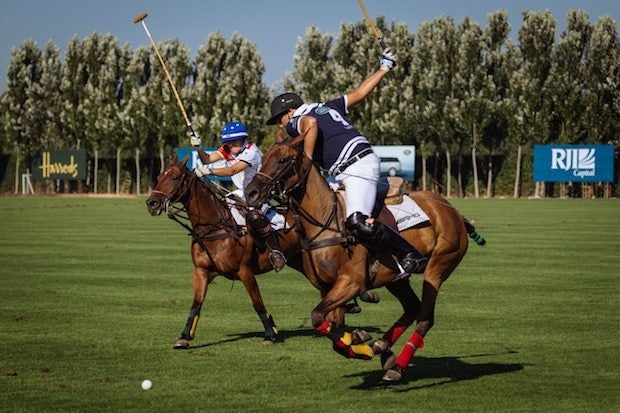
It may be called “British Polo Day,” but at its China stop on its global tour, the event’s CEO and co-founder Edward Olver is the first person to admit that China had the sport well before the British. “Traditionally, the culture of polo and horses originated in China,” he says, noting that elites during the Tang dynasty were avid players.
On September 13, a VIP guest list including Vogue China Editor-in-Chief Angelica Cheung, the British Defense Attaché to Beijing, and members of the Cambodian royal family gathered at the Tang Polo Club outside Beijing to sip Champagne and watch some of the world’s top polo players take to the field at the fifth annual British Polo Day in China. Founded in 2009, the event showcases the British version of the “sport of kings” to the newly minted elites of the world’s top emerging markets. And the British purveyors of the ancient sport don't shy away from the fact that China had it first, pointing out that the Tang Polo Club’s name refers to the fact that the game was an imperial sport during the Tang dynasty after it was thought to enter China via Central Asia or Iran.
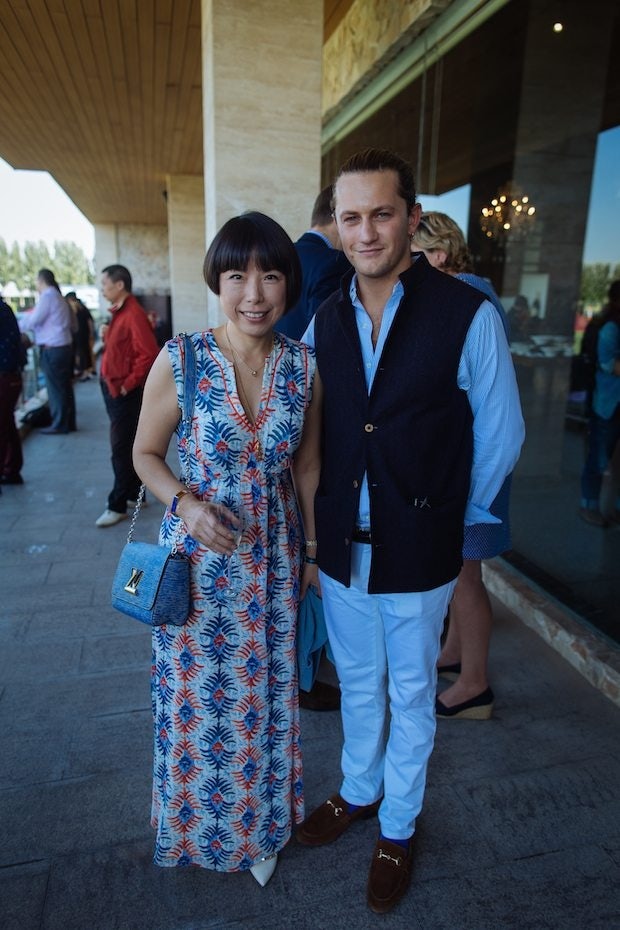
With stops in 15 countries, the event serves as a promotion of all things British to the nouveau riche of some of the emerging markets most heavily targeted by the luxury industry. The event was born out of a diplomatic mission to Abu Dhabi carried out by Olver, a former Adjutant of the Household Cavalry Mounted Regiment in the British army. With a background that includes both serving in Iraq and overseeing the royal wedding parade, Olver first thought of the idea to promote "brand Britain" abroad through horses when he convinced Sheikh Mansour of Abu Dhabi to fly 50 of the queen’s horses to the desert for a presentation in 2009. The prototype of British Polo Day emerged when he teamed up with the event’s co-founder Tom Hudson, a Dubai-based lawyer, to host a polo match in Dubai for the alumni of the prestigious British boarding school Eton College.
Held mainly in locations across Asia and the Middle East—including in some former British colonies—the traveling showcase is a sign of transforming global power dynamics, according to Olver. “As we leave this American epoch and enter an Asian paradigm, the world is changing,” he says. “We’re leaving this egg-shaped demographic and we’re moving into this world of key influence.”
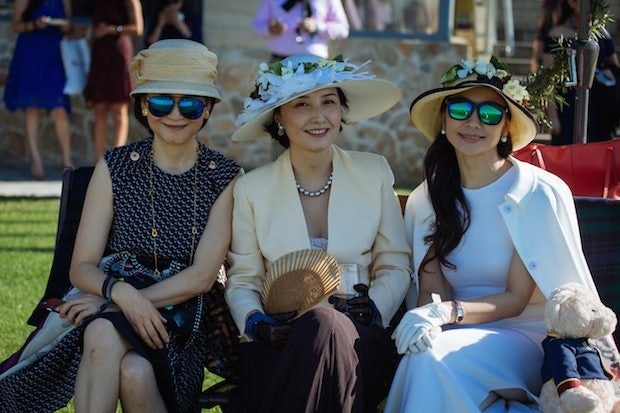
He believes that China is an especially important market for the event as it aligns itself with a new world order. “I think the Chinese are going to be the most influential superpower. Africa is going to be the next big opportunity. The Chinese are deeper in Africa than anyone else. My strategy is to build the best relationships I can so that I can work with key influence to achieve anything we want.”
The best way to build these bridges is through the horse, asserts Olver, who notes that the event has worked with 12 royal families, 110 international billionaires including Richard Branson and Elon Musk, and “24,000 of the world’s most influential people.” According to him, “The horse is an international language. It doesn’t matter if you speak Arabic, Russian, or Mandarin. If you understand the horse, you have a bridging point.” The majestic animal’s power for cultural diplomacy was on full display at the event as well-heeled Chinese ladies in elaborate hats fit for a royal wedding flocked to photo breaks in between chukkas to take horse selfies.
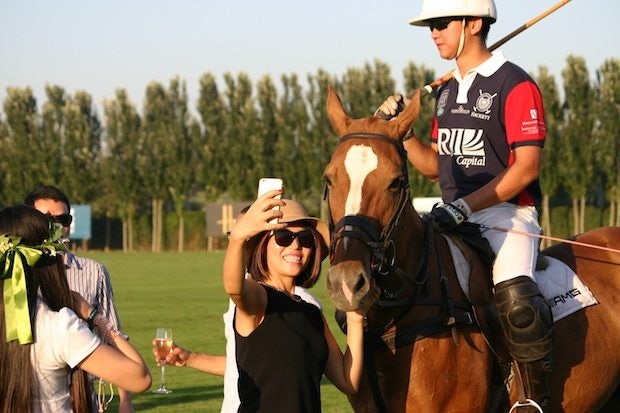
As it promotes the elite sport to China’s wealthy, British Polo Day is joined by a growing number of entrepreneurs opening increasingly elaborate polo fields across the country, such as Tang Polo Club Founder Liu Shilai, who is regarded to be China’s best polo player and participated in the British Polo Day tournament. Liu says that the club currently has 60 members, and has hosted the China Open Polo Tournament for the past five years and hopes that it will cause more people to take polo seriously in China.“Hosting the China Open Polo Tournament means a lot more than just to promote it because it is popular; we aim to take polo to another level,” says Liu.
Olver also believes polo is catching on among China’s wealthy, noting that China has more polo clubs being built than anywhere in the world. “The elites in the 80s played tennis; the elites in the 90s played golf. I think now, the truly inspirational sport for those people who want to demonstrate themselves as totems in their community is polo because it is relatively unusual, it’s new, but more importantly, it is Chinese.
“We had one Chinese patron who flew from Shanghai to Sydney and then drove to Canberra just to watch us play one match. The appetite is huge, the opportunity is huge, and the growth has been phenomenal.”
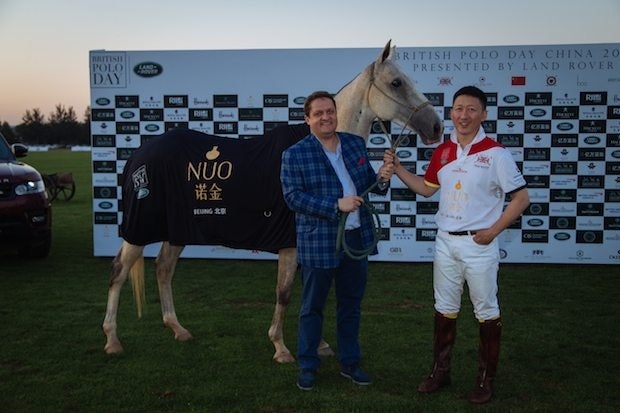
But a look at the event’s roster of luxury partners shows that high-end British branding is just as, if not more important than, the horses themselves. Storied names like Land Rover, Harrods, the queen’s wine merchant Justerini & Brooks, and Royal Salute were showcasing their wares at British Polo Day, while pre-events included a Justerini & Brooks wine tasting and a Harrods-sponsored garden party with both Chinese and British tea ceremonies. “At Harrods, we have never operated a shotgun approach to our marketing. It’s about picking out certain key individuals who have luxury aspirations and an aspiration with the brand, and British Polo Day fulfills that,” says Harrods Managing Director Michael Ward.
China’s ongoing luxury market slowdown doesn’t faze the event organizers, who say that British brands can actually benefit from the government’s anti-corruption crackdown.
“There’s a very natural adjustment in China happening. It was quite vulgar—the consumption that was happening,” says Olver. “I think it’s a very legitimate desire of the government to make sure that everything is fair and just. These are very noble aims.” He says that since many French and Italian brands “were here to effectively slice the golden goose,” they overextended themselves in the China market. “The irony of that,” he says, is that British brands “find themselves in a fortuitous position because people aren't wanting to buy a Louis Vuitton.
“We’ve recognized now that the the elite Chinese consumer is more interested in integrity, values, heritage, bespoke—some of the things that actually suit a British brand much more.”
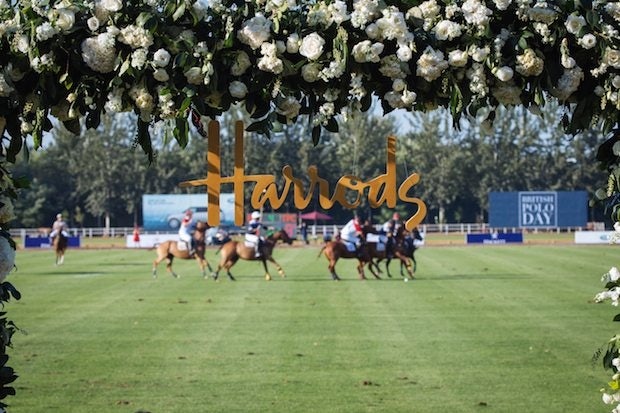
He also notes that the event has run into no problems with the Chinese government even as it cracks down on luxury advertising as a part of the anti-graft campaign. “We’ve always had a good relationship with the government,” which has used photos of the day in official billboards at the Beijing Capital Airport.
Sitting in the recently opened, ultra-luxe state-owned NUO Hotel that served as a partner for the event, Olver states, “Just at this moment when people think that China’s focused on austerity and dialed down on luxury, we’re staying in a hotel which has been pioneered by the government as a representation of Chinese luxury hospitality.”
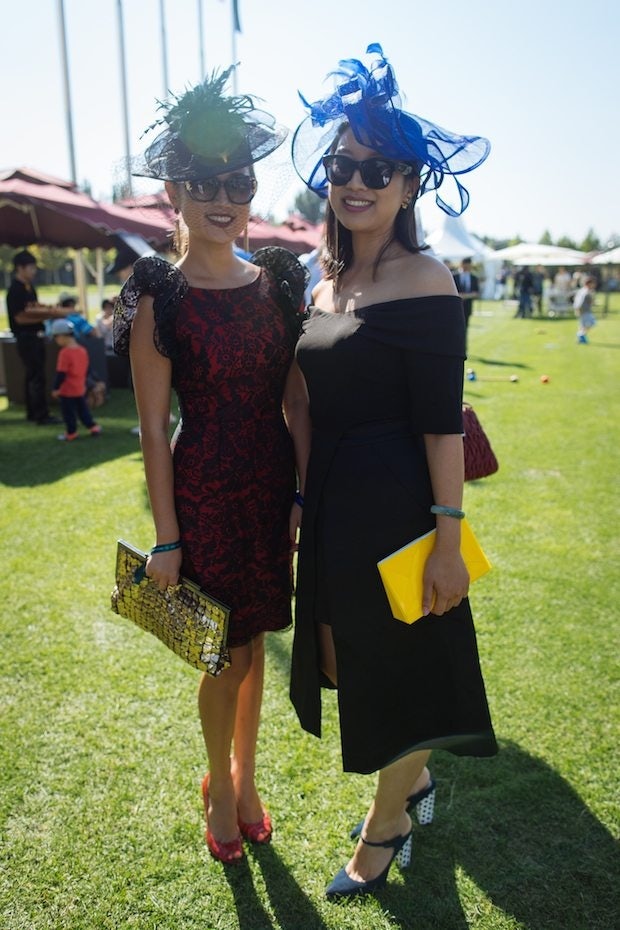
Despite ominous recent news about China’s shaky stock market, currency devaluation, and downgrade of its GDP growth report, Olver also remains upbeat about China’s economic growth in the long-term. “I’m very bullish about the opportunities here,” he says. “I think a lot of the perspectives that have developed outside of China are not influenced by the realities we find on the ground."
He also notes that the event has benefited from the rise of “experiential” luxury and the decline of bling among China’s rich. “I’m not arranging fluorescent supercar races, which probably would be out of vogue. I’m delivering something which actually fits very neatly into the new age,” he says.
“Ultimately, if you’re very wealthy, you can buy anything. But what money can’t buy is that genuine authentic experience.”